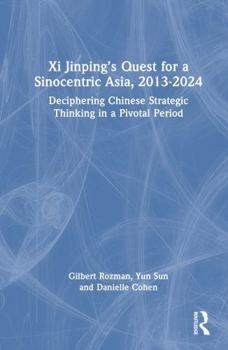XI Jinping's Quest for a Sinocentric Asia, 2013-2024: Deciphering Chinese Strategic Thinking in a Pivotal Period
Recognising Sinocentrism as the core motivation behind Xi Jinping's vision for the reconstruction of Asia, Rozman, Sun and Cohen present a comprehensive and updated analysis of Chinese foreign policy towards Asia, uncovering the deep-seated calculations behind Xi's policies across four arenas of distinct interest in the last decade.
The book employs strategic thinking and Chinese language resources to examine multiple areas of China's foreign policy, gaining insight into policy development and its wider consequences for Asia. It critically examines numerous facets of China's foreign policy, including Chinese perceptions of the U.S. role in the Indo-Pacific, strategic thinking towards Northeast Asia, policies towards India, Southeast Asia and Australia, and the approach to Central Asia to comprehensively ascertain Xi's strategies and motivations. By examining the reticence of Chinese spokespeople and publications to identify the objectives of China's policies over a decade, the book interrogates the predominant motivation of Xi's Sinocentrism in creating a dominant civilisation insistent on subservience within its sphere.
The authors provide a timely assessment of China's grand strategy and Xi Jinping's ambitious efforts to build a Sinocentric axis in Asia and a valuable resource for students, academics, policymakers and researchers of Asian Studies, International Relations, Asian security, Xi Jinping thought, Sinocentrism, and Chinese foreign policy.





